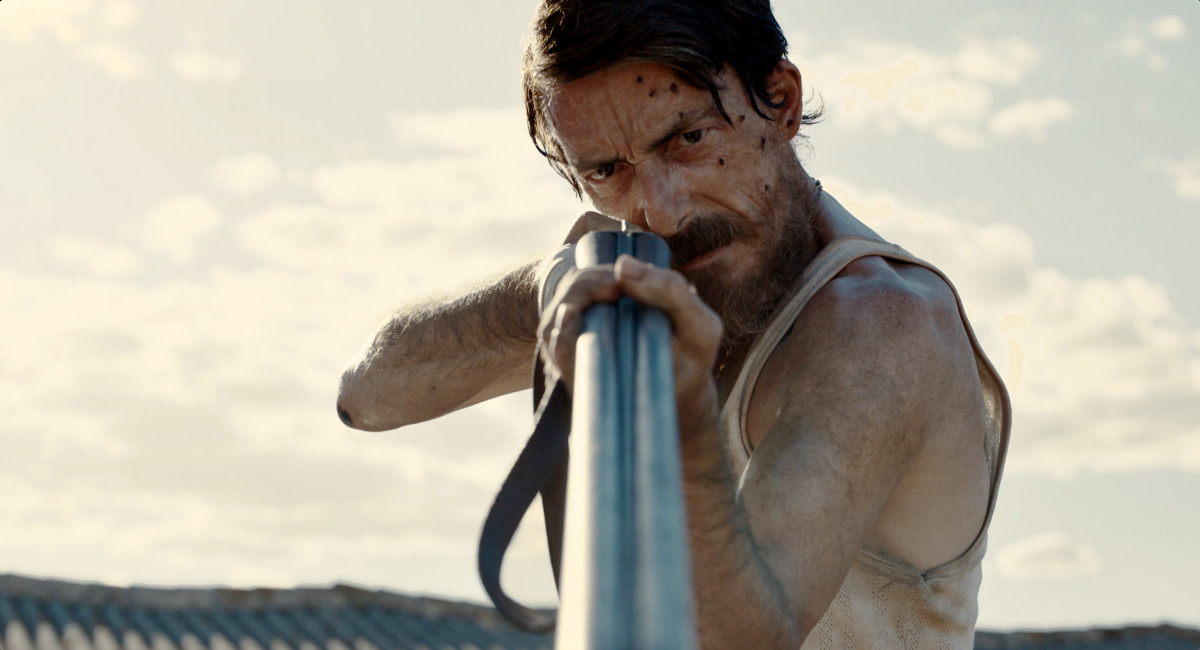
You have to feel for poor Eladio: the man’s a mess. Bad luck and bad habits have left him a scrawny nub, and his family in poverty. So when Don Francisco, the region’s big boss, offers him a job it looks like a second chance. He becomes a “keeper,” essentially a game warden, overseeing hunting parties. He moves his wife and son to the Spanish mountains, a remote place of brown grass and evil intentions.
A boss, Don Carlos, offers Eladio a bribe to up the number of hunting stations, situating the stations dangerously close to each other. Eladio resists the temptation; this would go against Don Francisco’s contract. He wants to live a more upstanding life. But his family takes him to task. His son begs to learn to hunt; his long-suffering wife Marcia calls him a coward. Eladio gives in and takes the bribe.
Bad choice. A series of catastrophes play out. Disasters, omens and ghosts convince him he’s cursed. His miseries, worthy of Dostoyevsky (or James M. Cain) are many and mercies are few. He goes from one fresh hell to another.
F. Javier Gutierrez’s new film The Wait (La espera) could as easily be called The Weight for all the protagonist has to bear. It’s engrossing and powerful; the sweat and grime of the setting are practically characters onto themselves. Mr. Gutierrez is a skillful filmmaker. He employs horror movie tropes to underscore Eladio’s suffering, to great effect. The Wait is framed in a web of closeups and rack focuses: one stirring image—a sugar cube dipped in black coffee, an insect crawling on a dirty bottle, a tough rope chewed through—dissolves into another, implying that Eladio’s actions, no matter how well-meaning, will lead to consequences much worse.
Victor Clavijo as Eladio leads a fine cast that includes Ruth Díaz as his wife and Moisés Ruiz as his son Floren. Manuel Morón and Antonio Estrada are convincing as sinister figures. All are familiar to Spanish audiences from their work in television.
Mr. Clavijo plays Eladio as a wan supplicant, fighting fate and his urge to drink. His soulful eyes elicit our sympathy as he goes through each torment, and our spirits lift when signs appear that he might not be a victim of circumstance at all, but the victim of a nefarious plot. Which implies that he might be able to save what’s left of his life.
(Spoiler alert: I’m going to discuss the ending; if you plan to see The Wait, you may want to come back to this review later.)
In a narrative like The Wait, we the audience are asked to suspend disbelief and invest in the character. The tougher the obstacles, the more we want (expect) the protagonist to prevail. Why else go through this if salvation isn’t at the end of it?
Mr. Gutierrez’s film presents itself as a mystery to be solved. Clues pile up, the shape of something bigger becomes evident. It’s not, however, the mystery it appears to be. It’s a parable, a cautionary tale. But what exactly is it cautioning against? The Wait’s resolution has the ambiguity of, say, Rosemary’s Baby. But that film’s ambiguity left Rosemary with a choice and warned the audience that the Devil might live next store.
What does The Wait warn us of? What choice is Eladio left with? What good is his sacrifice without redemption? Eladio the sad sack just becomes sadder. And the film’s nihilism just leaves us deflated, waiting for...what, exactly?
___________________________
The Wait. Directed by F. Javier Gutierrez. 2023. From Film Movement and Nostromo Pictures. 102 minutes. In theaters and on VOD.
